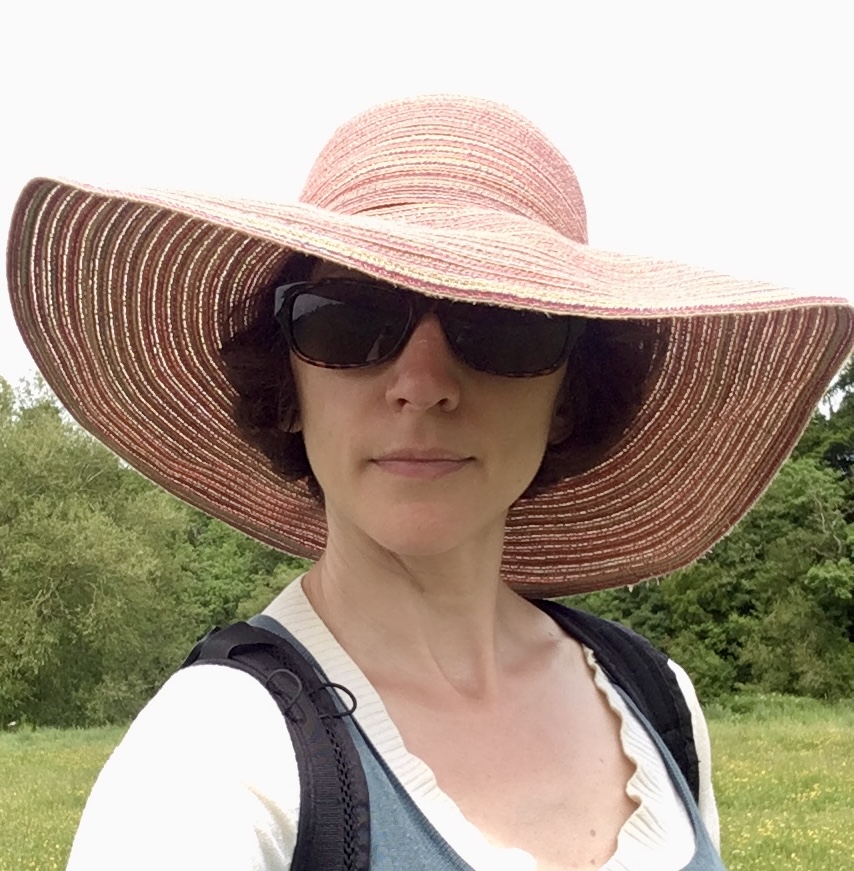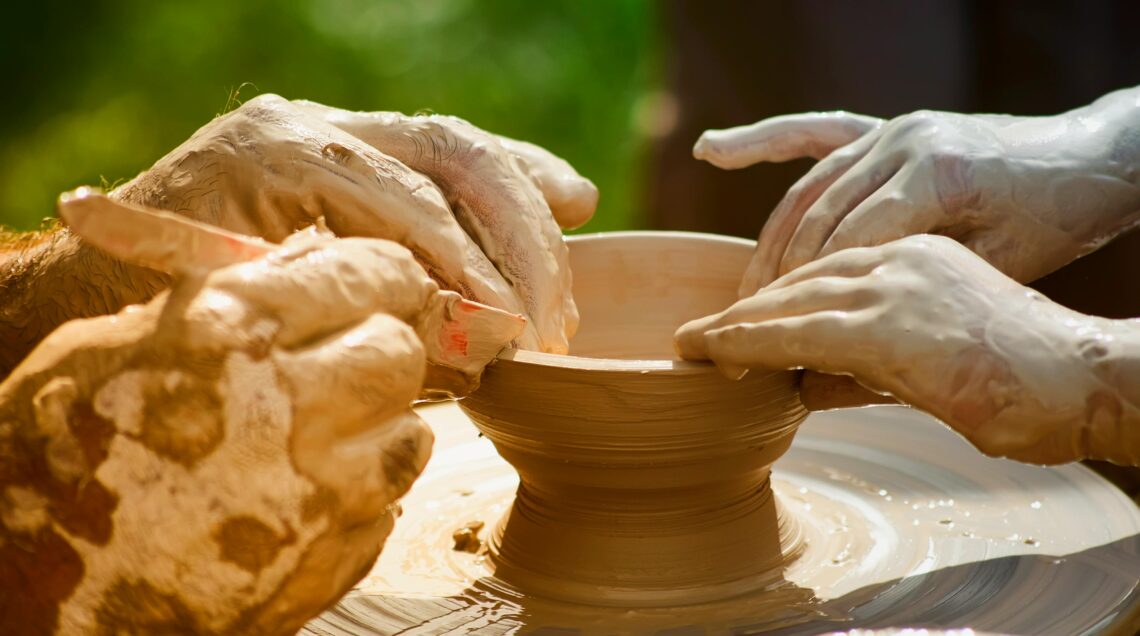by Alice Wilding
Every week, Nina asks if I want to come to the arts workshop. She noticed the bowl on my windowsill on her first day and picked it up, holding it lightly with brown fingers. She asked how it was made and why. She was curious but couldn’t stay long enough to hear my answers.
I am curious too. Nina always has to leave. Where does she go when she pulls on her heavy wool coat and mittens and walks out through reception? Whose eyes does she gaze into at night? What does she do to keep her mind nimble when she is not here, folding sheets and wiping down the ugly furniture that surrounds us?
I feel a kind of cosmic repulsion when I touch the surface of the cabinet beside my bed. I had a similar thing for my doll’s house when I was a girl. It looked like wood but was not. Even then, even when I was young and often delighted by the chaff of the world, the miniature fakeness offended me.
My daughter inherited the doll’s house and adored it. I was a distracted mother, always covered in clay. I used to place her in front of the television at lunchtimes and she’d watch cartoons and animated stories as long as they spooled through the channel. I hated the bright colours of infancy but recognised the time they gave me.
She ran to fetch me when her favourite programme came on and I would join her in the lounge for a few minutes. I liked to pretend to rub my clay-flecked fingers across her face and she would scream and hide behind the cushions. While we play-fought, figures made jerky movements across the screen to gentle strumming music. I thought they were well crafted, these figures, filled with life. Mice, a woodpecker, a pink cat.
The television that plays in the activities room bellows with the sound of daytime voices. Soap operas and game shows. It’s all histrionics and greed with flimsy staging. I featured in the opening credits of a Portuguese soap opera once, I told Nina. I never saw any of the episodes. It was the summer I met Mia’s father and they were shooting outdoor scenes in the plaza beneath his apartment. We strolled arm in arm across the square in the light of the cameras.
We didn’t go to Spain or Portugal or any of those places as children. We went to the lake, my mother and sister and me. We cycled and swam. Our mother in a bikini, urging us into the blue. Our twin fears: the cold and dissolving into water.
This morning, Nina asked if I was looking forward to seeing my daughter today, and I had to tell her again that I no longer have a child. I had a daughter once. She wore me out. But sometimes she stopped still and watched programmes for a while. Her favourite was the one about the mouse mill, the chocolate biscuit machine. Nina laughed and asked what I meant, but I thought it would spoil the surprise if I told her, ruin the trick of it all.
“It’s the arts morning today, my love,” she said. “You’ve time to come along before Mia arrives. How about it?”
Nina must be around my age, I suppose. Maybe a little younger. It’s hard to tell because the skin of her face is smooth, as if it has been stretched over a frame. Her eyes are like wet pebbles on a shore. She doesn’t look like an artist. But then perhaps I don’t either. As a young woman, people were always mistaking me for an office girl. I looked like I licked stamps for a living. I sometimes wonder why I didn’t take the same path as my sister, cycling every day to the local factory until one of the managers married me and built me a house with a shed and a nursery.
“Or I could sit here with you for a little bit of a while. You could tell me about this.” She picked up the bowl again. I waited for my stomach to protest and my smile to tighten, which always happened when somebody went to touch my work. That time in the Bath shop under the stinking arches of the river bridge, when a tourist from London lifted piece after piece up to the light. Each one the same apart from a unique scratch somewhere in the paintwork, tiny and exquisite. The Tiffany-style glass ceiling lamp cast orange and yellow shapes onto them and I wanted to scream.
Mia told me – not then, she wasn’t born – but later, as a grown woman – that I needed to let myself connect. She was the only person I could ever bear handling my pots. I had made them all for her, one way or the other, trying to complete something in each curve and mark. “Ridiculous!” she yelped as she picked them up. “Impossible.” She held one perched on the fingers of her left hand and raised her right palm in front of my face. “You have to let people find these. Love! Engage! You could make millions.”
But I never wanted to sell much or make millions. I just liked the feel of clay drying on skin and the mystery of imperfection. The flaw or crack. Every time you make something new, a little something is lost.
“Every time you make something new, something is lost?” Nina repeated my words, mouthing them in dark rounds that drifted into the air like smoke rings. I must have said these things, but they made no sense. Like flashcard words. I could spell out the letters but was too young to know the meaning. ‘Mice.’ ‘Home.’ ‘Gone.’ My sister giggled, eyeing our mother for a sign that I was overreaching, pulling too far ahead. But I felt the burst of triumph and delight.
Nina only stays for so long, I know that. She has her coat and mittens to put on. Does she have a sister? A daughter? Does she watch soap operas when she gets home? Or does she study the skies? I only know she doesn’t stay. She walks out through reception. There is another of my bowls on the desk there, filled with wrapped mints.
“Tell me again about your twin,” Nina said, putting the pot back on the windowsill. It made a mirror image to the plastic box suctioned against the glass. Seed for birds. Mice too, I imagine. Everything here is ground level and safe.
I don’t know why she asked about Iris. There’s nothing to be said. My sister always cycled everywhere, wearing her bikini top and shorts, even after marrying. Where I was made of edges, she was soft and round, comforting as a chocolate biscuit.
She brought her bike to visit me in Bath once, though I’d told her about the hills and the air thick with fumes and thieves on every corner. To and fro, to and fro. Until the day she was hit and went over the windscreen of the car.
Nina handed me a tissue, a gauzy thing, from its shell-covered box. You could see the two layers pulling apart and fit for nothing. She pressed her hands against mine. They would make good potter’s hands. People think artists’ hands should be thin and bony, like pianists’. But clay is like flesh, needing tender guidance.
“There was only ever one chocolate biscuit,” I said. “The mice couldn’t make any more out of beans and breadcrumbs.”
Nina put her fingers on my cheek. She told me she had to go. But my daughter would come soon and look after me. She would remember the programme about the chocolate biscuit machine. It was a mouse mill, a water mill, and the trick of it was there was only ever one chocolate biscuit going round and round and round.
I watched Nina in the reflection of the door, where I could see her put on her mittens and coat and walk out through reception. The ring of a bicycle bell greeting her as she left, a bright shining sound that made me think of Iris learning to ride, her plump legs only just reaching the pedals. The way my stomach tightened and I shook as if I had just come out of cold water.
I wanted to shout after Nina and tell her I no longer have a sister, but my voice was washed away by a screech of brakes, a crashing, like waves on the lake shore. Then a grown woman crowded into my room, taking a tissue from the box to wipe blood from her palm. She reached over and pretended to rub her fingers across my face. “Just a scratch,” she said. “Hello Mum.”

Alice Wilding lives and writes in Oxfordshire. She often walks. She sometimes tries to play the bass guitar. Her stories celebrate ordinary things, reflecting her interest in how people age, change, and remember. She has two cats, who never read her work.


